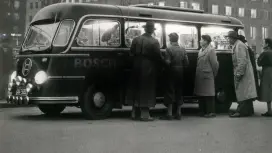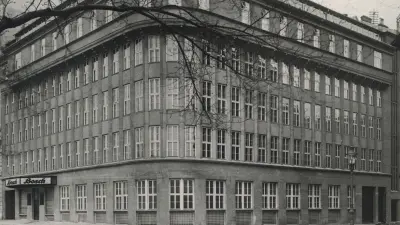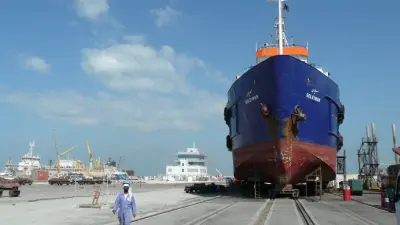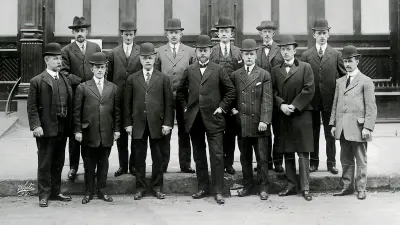Bosch production in France: premiere in Paris in 1905

France has the distinction of being home to the first Bosch factory outside Germany. Opened in Paris in 1905, the plant manufactured Bosch’s only product at the time, the magneto ignition device, which helped to give the internal-combustion engines of early automobiles the ignition they needed. France had a fast-growing automotive market at the time, and the Bosch magneto ignition device was in high demand. After the end of the first world war in 1918, however, the Stuttgart-based company lost all of its assets in France. Bosch had to rebuild its activities in France on two occasions, with economic and business relations between Germany and France literally in ruins after 1945 as well.
A launch with a group picture

The history of Bosch manufacturing in France started around the time of the 1905 Paris Motor Show. Bosch representatives from throughout Europe traveled to the event, with the company founder himself even making the journey from Stuttgart. The reason for the group picture, however, was an even more important one for the development of Bosch. The French Bosch sales office, Compagnie des Magnétos Simms-Bosch, had invited the representatives to attend the grand opening ceremony of a factory on Paris’ Rue Violet, marking the start of production abroad at Bosch.
A success story and its temporary end

Six years earlier, Robert Bosch and the British engineer Frederick R. Simms had founded Compagnie des Magnétos Simms-Bosch. According to the business agreement, Bosch would contribute its patents, while Simms would invest the capital and manage the company. Initially, the venture imported products. To make local production a reality, Bosch sent one of his best associates to France, Max Rall, who had already acquired tremendous technical expertise at Bosch as an apprentice. In June 1906, Bosch became the sole owner of the Paris-based company, which was renamed Société des Magnétos Bosch in 1907. The first world war broke out in August 1914, putting an end to the Compagnie des Magnétos Bosch success story for the time being. Together with other German associates, the company’s management was forced to return to Germany. In 1918, the sales office was placed under compulsory administration by the French government, and the factory was immediately expropriated. The war had left such deep wounds that it was impossible to reopen German business in France right away.
A princely offer

It was not until 1930 that Bosch was able to open a new plant in France – in partnership with the industrialist Henri de Lavalette. The count, who was almost the same age as Robert Bosch, was a pioneer of the magneto ignition industry in his native country and had had connections with Stuttgart since the start of the 20th century. At the end of the 1920s, Bosch decided to start production in the countries where its customers were based. France was one such country. Negotiations with Count de Lavalette proceeded quickly and smoothly. Bosch acquired a 50 percent share in Société des Ateliers de Construction Lavalette, thus sealing the licensing deal for the production and sale of Bosch products in France. Production of automotive parts such as magneto ignition devices, horns, windshield wipers, generators, headlights, and injection pumps started at the impressive new factory on Avenue Michelet in the Paris-area town of St. Ouen in 1930. In cooperation with the Bosch subsidiary Point Bleu, the location also made radio speakers, radio housing, and radio receivers. Lavalette-Bosch car service garages were set up in the south, east, and north of France.
A restart after 1945

The friendship survives
Despite having its assets expropriated once again after the second world war, Bosch was able to quickly recover and focus on expansion thanks to the continued amicable relationship with its French partners. Bosch took its sales activities into his own hands in 1962 by founding a regional subsidiary, Robert Bosch France, in the Paris suburb of Châtillon. The subsidiary was moved to St. Ouen in 1966. In 1962, Lavalette and Bosch also founded a joint venture, Les Constructeurs Associés S.A. (LCA), in the area of diesel production, this time in collaboration with Précision Mécanique Labinal. Bosch acquired LCA in 1964, helping it gain a number of plants, including the one in Rodez, which has since become the largest Bosch production facility in France. Due to growing demand, Bosch expanded its diesel capacities in 1974 by acquiring the in-line pump manufacturer Sigma Diesel and its plant in Vénissieux.
Major employer and important market

By the 1980s, Bosch had become one of the largest German employers in France, with five locations manufacturing automotive technology (Rodez, Vénissieux), pneumatic and hydraulic components (Rumilly, Bonneville), and car radios (Mondeville). In recent years, Bosch has continued to reposition itself in France with innovative products and production methods for the future.
Today, the development in the Western European country continues. With innovative products and production methods, the company has repositioned itself for the future. For example, Bosch is working with partners on a prototype for an autonomous train for travellers. Another example is the FresH2 fuel cell system project initiated by Bosch at its Rodez location, which has already conducted initial road tests under real-life operating conditions.
So, Bosch in France is not only well positioned for the future, but is also making an important contribution to Bosch’s business despite the current challenging economic situation.
Author: Vera Dendler



